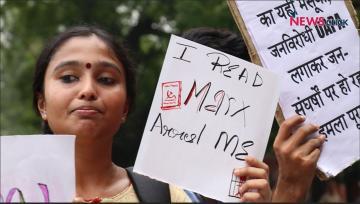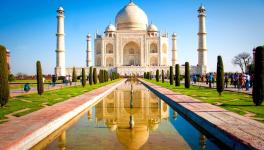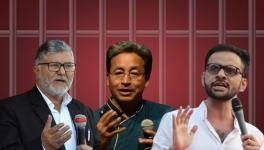Return of the ‘Urban Naxal’ Bogey

File photo
“…the more things change, the more they stay the same…
(plus ça change, plus c’est la même chose)
--Jean-Baptiste Alphonse Karr, French writer,
Despotic kings or autocratic leaders share one thing in common. They have an uncanny ability to live in their bubbles or not learning from the immediate or past history at their own peril.
Narendra Damodardas Modi, the Rashtriya Swayamsevak Sangh (RSS) Pracharak (propagandist), who famously declared during elections held for the 18th Lok Sabha that he was ‘non-biological’, looks no different. He has returned as the Prime Minister of India - for the third time, albeit with a reduced majority and with support from mercurial allies. Yet, he still wants to believe that nothing has changed. The oath taking ceremony, where (barring Pakistan) leaders of other neighbouring countries were invited, looked like a coronation of sorts.
Much on the lines of a king from a literary fairy tale written by a legendary Danish author, he is going about his business with usual élan.
The ‘business as usual’ attitude is quite visible in the way the issues of paper leaks in high-profile examinations, under the nose of the Central government, or railway accidents, are being handled. Whereas the earlier two tenures of the Modi government - with a brute majority on its side - were marked by no resignation of ministers despite alleged acts of omission and commission under their own thumb, his third term as head of a coalition government is not showing any change.
What is further shocking is that there has been a sudden spurt of attacks against Muslims at a pan- India level, after the election results were out, further emphasising that the Hindutva Supremacists would now be more aggressive toward 'others'.
The continuation of the earlier modus operandi of the ruling dispensation is also evident in the way the regime treats truth-seekers, or even luminaries who have refused to go silent, is an indication of the days to come The sudden revival of a 14-year- old case against renowned author Arundhati Roy and a Kashmir-based academic Sheikh Showkat Hussain, under the Unlawful Activities (Prevention) Act for remarks made at a seminar in New Delhi in 2010, adds a further chilling effect to the ambience.
Not satisfied with the hounding of journalists and luminaries, this regime has also deemed it necessary to revive the bogey of ‘Urban Naxals’ to send a message across that perhaps the worst is going to come.
There are widespread concerns already in the air about the three new criminal laws coming into effect, which would enable “[b]road criminalization of legitimate, non-violent dissent and opposition against the Governments'...'put in the hands of the Government of the day unguided, arbitrary and virtually unlimited power to selectively arrest, detain, prosecute and convict practically anyone they choose, including by branding them as terrorists and as anti-national.” (-do-)
Maharashtra Chief Minister Eknath Shinde, in one of his post-result speeches, talked of “Urban Naxals penetrating NGOs and help creating ..false narratives against the government”. One can see this as an echo of the past when there were reports about Maharashtra officials thinking of promulgation of such a strict law to curb ‘Urban Naxals’.
We had witnessed the same rhetoric in the election speeches or interviews of Prime Minister Modi, or his associates, e.g. who had termed the very idea of Congress to survey the state of India’s wealth distribution, or its pitch for caste census “[a]s an example of an “urban Naxal” and ‘Maoist” mindset.” Amit Shah, Modi’s closest confidante and the country’s Home Minister, has also not been far behind in raising this bogey.
For the peddlers of this bogey, it hardly matters that Kiran Reddy of the ruling Bharatiya Janata party (BJP), the then home minister for state, Shah’s junior minister, had categorically stated on the floor of the House that the term 'Urban Naxal' does not exist in the vocabulary of the Ministry of Home Affairs.
Anyone could see that this was just a formal response for public consumption and did not stop the government or its cheerleaders from criminalising or stigmatising voices of dissent.
The ruling dispensation is clear that since Naxals are seen as violent gangs who claim to work for people but effectively spread anarchy, this bogey of ‘Urban Naxal’ facilitates it to criminalise anyone who refuses to play ball.
It is an interesting coincidence that the Home Ministry's formal acceptance that the word ‘Urban Naxal’ does not exists in its vocabulary, sounds similar with the way it responded that it does not have any information on the 'tukde tukde gang' - a term which essentially implies the dismembering of India, an attack on its territorial integrity-- has been similarly widely used since the past 10 years to terrorise and criminalise critical voices.
It is now part of history how right from PM Modi, his aide Amit Shah to the troll army gang, everybody had joined the chorus to castigate this ‘omnipresent tukde tukde gang’. Modi himself seemed to allude to the term during a pre-election rally in May 2019, when he said, “Desh ko tukde-tukde karne wale ke saath Congress khadi hai...” (Congress stands by those who want to dismember the country)
When the Home Ministry was asked via a Right to Information or RTI application about ‘banning this gang’ under the Unlawful Activities Prevention Act (UAPA) and who its members were, the ministry admitted that it had no information on any such ‘gang’.
What then explains the continued usage of these terms?
For the Hindutva Supremacists, who want to usher India into a Hindu Rashtra and ensure that their vision of majoritarian nationalism should continue their dominance for decades to come, it is important to silence, subjugate or crush all the 'others'. Remember, Madhav Sadashiv Golwalkar, the second RSS supremo - their ideological fountainhead -- had made it absolutely clear how the Sangh considers all others, i.e Muslims, Christians and communists, as ‘internal enemies’ and how it wants to deal with them.
The fact that both these terms have wider appeal even among articulate sections of society even though these terms may not exist in official jargon or statues, shows that this bogey can still be pushed as part of the political-ideological weapon of Hindutva Supremacists.
In fact, 10 years at the helm of affairs of the world’s largest democracy has demonstrated to them that the broad masses do not feel perturbed if the government is seen going against ‘anti nationals’, ‘naxals’ or people engaged in ‘sedition’, ‘waging war against the state’, ‘overthrowing democracy’ etc. The ruling dispensation knows very well that armed with draconian provisions of various anti-terror laws, where trials cannot even start for years and obtaining bail itself is next to impossible, such people, who disagree and dissent, can be kept languishing in jails for years.
Any concerned citizen can look dispassionately at the Bhima Koregaon case (for a detailed treatment of the issue, read the book, The Incarcerations: BK 16 and the Search for Democracy In India by Alpa Shah, William Collins 2024) or the way the accused in the Northeast Delhi riots have been languishing in jail - and are not even getting bail - and infer where things have reached.
In fact, columnist Sushant Singh brings out a much-neglected aspect in the Bhima Koregaon case’ in his recent writeup:
“The Bhima-Koregaon case, in which 16 intellectuals and activists were charged under harsh anti-terror laws, was based on the loud narrative created by media outlets for months around a supposed letter that indicated a plot to assassinate Modi. Surprisingly, that letter has never featured in any of the police charges filed in the case so far. “
The ruling dispensation’s behaviour can be better understood if takes a fresh look at how National Security Adviser Ajit Doval shared his vision of ‘future frontiers of war’ to the newly-recruited IPS officers in Hyderabad:
“Quintessence of democracy does not lie in the ballot box. It lies in the laws which are made by the people who are elected through these ballot boxes. You are the ones who are the enforcers of the law… Laws are only as good as they are executed and implemented and the service that people can get out of it.”
“People are most important. The new frontiers of war — what we call the fourth-generation warfare — is the civil society. War itself has ceased to become an effective instrument for achieving your political or military objectives. They are too expensive and unaffordable.”
Perhaps, now it is easy to comprehend why the government suddenly deemed it necessary to give sanction to prosecute Arundhati Roy and a Kashmir-based academic for a speech they made 14 years ago.
Or why the bogey of ‘Urban Naxals’ is being refurbished when it is getting ready to fight the ‘new frontiers of war’ -- the civil society.
The writer is an independent journalist. The views expressed are personal.
Get the latest reports & analysis with people's perspective on Protests, movements & deep analytical videos, discussions of the current affairs in your Telegram app. Subscribe to NewsClick's Telegram channel & get Real-Time updates on stories, as they get published on our website.
























